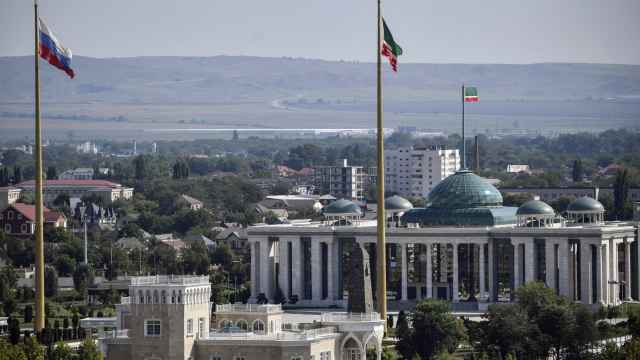April 1 marks the anniversary of Novaya Gazeta, Russia's fearless, opposition-oriented investigative newspaper. The publication was founded 20 years ago by a group of outstanding Soviet-era journalists who abandoned their alma mater, Komsomolskaya Pravda, in protest over the way the historic newspaper was trying to adapt to the new market economy. Ever since, Novaya Gazeta has flouted the commonly accepted rules of the media market and even disproven the principles set down by Marshall McLuhan, one of the founders of the modern theory of mass communication.
McLuhan once posed the question: "Why do newspapers exist?" His answer: to report bad news. He argued that such stories offered a counterbalance to the ridiculously optimistic advertisements, thereby increasing the sale of products and services, which in turn provides the newspaper with greater advertising revenues. Novaya Gazeta bears out this principle in one respect: Almost all of its news topics range from the bad to the very bad, documenting the corruption, incompetence and abuse of power of the authorities. Its readers are treated to this barrage of bleakness three times a week. But contrary to McLuhan's rule, the newspaper has no advertising. How is this possible?
A prominent Novaya Gazeta journalist once quipped, "The newspaper paints such a dark picture of life in Russia that I feel like hanging myself every time I read it." Perhaps only a handful of advertisers would consider a bunch of suicidal readers a promising target audience.
At the same time, however, I have a completely different take on life. Rising above the yawning abyss of bad news my favorite newspaper opens before me, I take renewed pleasure in the little things in life for which I can be grateful: Russians I see every day who do not resemble helpless victims or conniving villains at all. Or a young woman who, despite the daily hassles and corruption that can turn our existence into a living hell, finds the strength to proffer a genuine smile. Or even the countless cafes and restaurants for every budget and taste that are filled from morning to evening by Muscovites. What's more, I am thrilled that the city buses run on time more often than not and that the local newsstand sells numerous newspapers and magazines.
What Novaya Gazeta lacks in advertising it more than makes up for in honors and awards. Earlier this month, U.S. Secretary of State John Kerry and first lady Michelle Obama personally presented an award to Novaya Gazeta columnist Yelena Milashina. After winning the presidential election, Dmitry Medvedev chose Novaya Gazeta for his first interview in a Russian newspaper. Editor-in-chief Dmitry Muratov was given the honorary title of knight by the French Legion of Honor. Even Germany's League of Protestant Cities has given the newspaper an award. I view the numerous foreign and domestic, state and civil awards listed on the newspaper's website with the same reverence that I view a stately portrait of my idol, Soviet leader Leonid Brezhnev, perhaps the most popular Russian leader after President Vladimir Putin.
There is much more that I could say in praise of my friends and colleagues at Novaya Gazeta, but I will close with one wish: May Putin's regime continue for many more years. After all, as long as he is in power, the newspaper will have plenty of grist for its mill. And may McLuhan roll over in his grave.
Alexei Pankin is the editor of WAN-IFRA-GIPP Magazine for publishing business professionals.
A Message from The Moscow Times:
Dear readers,
We are facing unprecedented challenges. Russia's Prosecutor General's Office has designated The Moscow Times as an "undesirable" organization, criminalizing our work and putting our staff at risk of prosecution. This follows our earlier unjust labeling as a "foreign agent."
These actions are direct attempts to silence independent journalism in Russia. The authorities claim our work "discredits the decisions of the Russian leadership." We see things differently: we strive to provide accurate, unbiased reporting on Russia.
We, the journalists of The Moscow Times, refuse to be silenced. But to continue our work, we need your help.
Your support, no matter how small, makes a world of difference. If you can, please support us monthly starting from just $2. It's quick to set up, and every contribution makes a significant impact.
By supporting The Moscow Times, you're defending open, independent journalism in the face of repression. Thank you for standing with us.
Remind me later.





